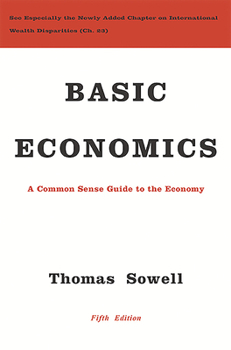Basic Economics: A Common Sense Guide to the Economy
Select Format
Select Condition 
Book Overview
The bestselling citizen's guide to economics Basic Economics is a citizen's guide to economics, written for those who want to understand how the economy works but have no interest in jargon or equations. Bestselling economist Thomas Sowell explains the general principles underlying different economic systems: capitalist, socialist, feudal, and so on. In readable language, he shows how to critique economic policies in terms of...
Format:Hardcover
Language:English
ISBN:0465060730
ISBN13:9780465060733
Release Date:December 2014
Publisher:Basic Books
Length:704 Pages
Weight:2.22 lbs.
Dimensions:2.3" x 6.1" x 9.3"
Customer Reviews
6 ratings
As informative as it is dense
Published by HarryP , 3 years ago
This book was dense in the best way. Some topics and theories covered by Sowell were so strongly worded it made the book hard to read, but it speaks to the level of thought put into it. This book covers a lot of ground for being called "basic economics". Rent control was my personal favorite section. If anyone struggles with understanding the human side of economics, this is the book for them. The reason I gave it four out of five stars was due to the fact that each chapter can be read as an individual essay, so it tends to backtrack ever so slightly every chapter. Overall, great book that will educate just about anyone who is willing to put the time into reading it.
Handy guide
Published by N.I , 3 years ago
easy to read and understand.
A "must read"....
Published by Thriftbooks.com User , 17 years ago
Everyone without a degree in Economics should read this book. This is a very easy and practical way to understand basic economic principles. Sowell is a master at making seemingly complex concepts into something very understandable by removing all the unecessary jargon and replacing it with real life examples we can all understand. I'e read this book twice. The second reading two years later than the first. I got as much out of it the second time as I did the first. I'll share this book around the family, but will definately be getting it back again.
The one book to read for a good understanding of economics
Published by Thriftbooks.com User , 17 years ago
This is simply the best book on understanding rudimentary economics available. This book takes a sophisticated subject and makes it very clear and understandable. While not as detailed as a textbook on the subject would be, it gets across the main theories of economics with real examples that can be understood and related to by almost anyone. This is simply the best and most readable source available to get a basic understanding of economic principles.
Fascinating inquiry into a seemingly benign subject
Published by Thriftbooks.com User , 17 years ago
When one thinks of economics, one is typically confronted with the kind of malaise that Jimmy Carter once spoke of. However, Sowell's book is filled with concrete examples of how to apply some basic and interesting principles of economics in daily life, and he explains why these principles are so fundamental to our lives. I think all high-school graduates with any sense should read this before signing up for credit cards or getting a job, and certainly any college student looking for work as well. A fantastic read, which is certainly difficult to do when one is speaking about the economy.
I wish
Published by Thriftbooks.com User , 23 years ago
I wish there were some way to get this book into the hands of every household in America. Someone with the means should fund that project.The amazing thing is that what Sowell says throughout this book should need saying. Much of what he says is patently self-evident to anyone not blinded by idelogical prejudices. We should not have to continue repeating the mistakes of the past (and present). Sowell, in his own inimitable style, discusses clearly and concisely all of the basic issues involved in economics. Probably the most important thing he says repeatedly is that economic plans should NOT be evaluateed on the basis of their purported goals. Instead, they should be evaluated on the basis of the incentives they will create. It is a failure to take into account these incentives that explain why so many good intentions have resulted in complete and utter failure. Incentives, not intentions, are what count.If you want to know why the common analyses of the ecomomy and the common suggestions for improvement that are promoted by politicians, pundits, and professional news anchors are misguided and counter-productive, read this book.






